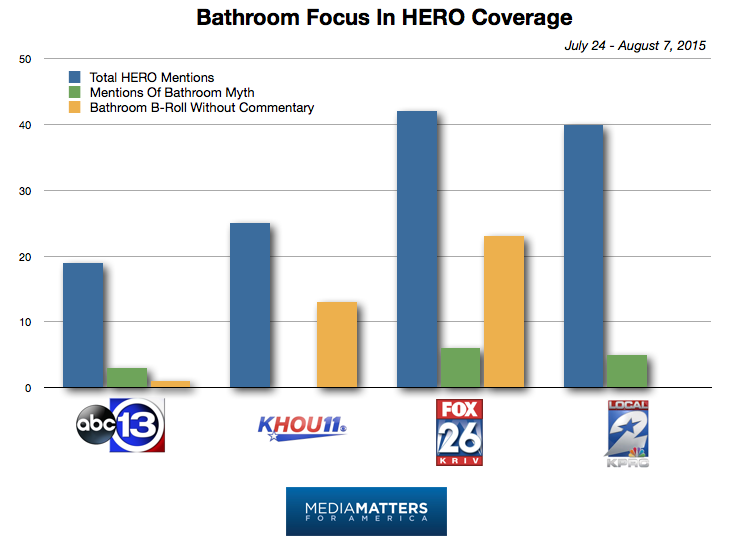
Houston voters are a few months away from deciding whether to keep or repeal the city's non-discrimination law. But local television news broadcasts are helping spread misinformation about the measure by uncritically adopting opponents' framing and talking points, essentially giving free airtime to critics of the law.
Enacted in early 2014, the Houston Equal Rights Ordinance (HERO) prohibits discrimination in areas like housing, employment, and city contracts on the basis of 15 characteristics, including race, sex, disability, religion, sexual orientation, and gender identity.
In July, the Texas Supreme Court ruled that HERO must either be repealed or put up for a public vote, setting the stage for a ballot fight in November.
But in the two weeks since the court's decision, local broadcast news stations in Houston have peddled misinformation about the ordinance and failed to give voters the whole picture.
According to a Media Matters analysis, Houston affiliates for ABC, CBS, Fox, and NBC have routinely depicted HERO as an LGBT non-discrimination law, ignoring HERO's broad protections for other groups:  This omission means that a significant part of the story isn't being reported: since HERO was enacted, the majority of complaints filed involved race, sex, and age discrimination. Yet the measure's sexual orientation and gender identity protections, which accounted for less than 5 percent of reported discrimination cases, dominated local news coverage.
This omission means that a significant part of the story isn't being reported: since HERO was enacted, the majority of complaints filed involved race, sex, and age discrimination. Yet the measure's sexual orientation and gender identity protections, which accounted for less than 5 percent of reported discrimination cases, dominated local news coverage.
Local TV coverage also uncritically repeated the widely-debunked myth that HERO would allow sexual predators to sneak into women's restrooms by pretending to be transgender - a bogus talking point championed by HERO's opponents. Houston's Fox and CBS affiliates included B-roll footage (scene setting video shown during a news report) of bathroom signs in over half of their HERO segments:
Pairing footage of bathrooms with stories on HERO is bad journalism, plain and simple. It reinforces the false implication that HERO is a "bathroom bill," rather than a basic non-discrimination measure similar to laws that already exist in over 19 states and 180 cities and municipalities. This type of skewed coverage is essentially free advertising for HERO opponents, who have a record of successfully defeating non-discrimination protections for LGBT people by fearmongering about women's restrooms.
Local news outlets in Houston have been contributing to misinformation about HERO since 2014, uncritically repeating opponents' attacks on the measure and lending credibility to the bathroom myth. Fox 26 has been especially irresponsible in its HERO coverage, making the bathroom horror story central to its reporting.
It's not surprising, then, that voters Houston have a wildly distorted understanding of what HERO actually does. As Rice University Political Science Chair Mark Jones noted on Houston's NBC affiliate KPRC, Houston voters are “focused in on the bathroom issue,” but otherwise people “really don't know” what the content of HERO actually is:
Houstonians should be able to count on their local TV news stations to help them make an informed decision about whether to keep or repeal HERO this November. By uncritically repeating critics' talking points and omitting crucial information about who has actually benefitted the most from the protections HERO affords, these stations are failing their viewers. In the more than two months remaining before the vote, journalists at Houston's local TV stations still have a chance to balance out their coverage and give Houstonians the whole story about what's at stake.